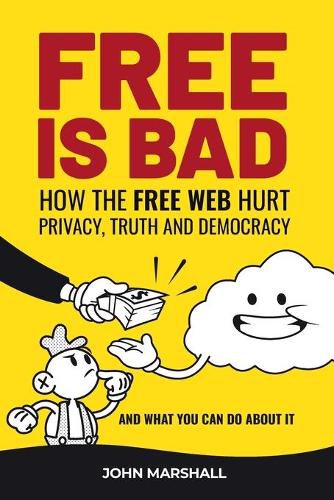Readings Newsletter
Become a Readings Member to make your shopping experience even easier.
Sign in or sign up for free!
You’re not far away from qualifying for FREE standard shipping within Australia
You’ve qualified for FREE standard shipping within Australia
The cart is loading…






Almost everything we consume online is free. Email, search, news, entertainment. But those apps on our phones aren’t really free–so if we’re not paying, who is? The surveillance marketing industry. They’re the customer. We’re the product. It didn’t have to be this way.* Web pioneers tried to invent new payment methods.* Google’s founders were dead set against advertising.* Email wasn’t always open to data mining.Yet here we are. Why?Because businesses can exploit our belief that Information wants to be free. It started way back in the early days of the republic, evolved with newspapers, radio and broadcast TV, and persists today online. In Free Is Bad digital marketing entrepreneur John Marshall explains how all that happened, and what you can do about it. It’s an exploration of the web industry’s early history and its search for viable business models. And it explains how an evolutionary accident in the design of the web resulted in the ad-tech industry, enabling free as the default model for technology products like search and email, and for media products like news and entertainment.* How did we become the product?* Why has that led to the fracturing of society?* How are new, people-first businesses improving matters?Free Is Bad offers not just a critique but optimism for a future where we control our online destiny. It also provides practical steps that will immediately improve your privacy and the quality of the information you consume.Ultimately we’re better off being the customer and not the product, because Free Is Bad.
$9.00 standard shipping within Australia
FREE standard shipping within Australia for orders over $100.00
Express & International shipping calculated at checkout
Almost everything we consume online is free. Email, search, news, entertainment. But those apps on our phones aren’t really free–so if we’re not paying, who is? The surveillance marketing industry. They’re the customer. We’re the product. It didn’t have to be this way.* Web pioneers tried to invent new payment methods.* Google’s founders were dead set against advertising.* Email wasn’t always open to data mining.Yet here we are. Why?Because businesses can exploit our belief that Information wants to be free. It started way back in the early days of the republic, evolved with newspapers, radio and broadcast TV, and persists today online. In Free Is Bad digital marketing entrepreneur John Marshall explains how all that happened, and what you can do about it. It’s an exploration of the web industry’s early history and its search for viable business models. And it explains how an evolutionary accident in the design of the web resulted in the ad-tech industry, enabling free as the default model for technology products like search and email, and for media products like news and entertainment.* How did we become the product?* Why has that led to the fracturing of society?* How are new, people-first businesses improving matters?Free Is Bad offers not just a critique but optimism for a future where we control our online destiny. It also provides practical steps that will immediately improve your privacy and the quality of the information you consume.Ultimately we’re better off being the customer and not the product, because Free Is Bad.